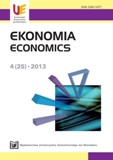Prawa własności filarem rozwoju gospodarczego
Property rights as a pillar of economic development
Author(s): Marian ZaleskoSubject(s): Economy
Published by: Wydawnictwo Uniwersytetu Ekonomicznego we Wrocławiu
Keywords: ownership; property rights; economic development
Summary/Abstract: Property rights consideration is one of the most important matters which is discussed in the theory of economy. It is worth emphasizing that till the mid 20th century the property was not valued in the main stream of economy. From the 60s of the previous century property rights theoreticians (among them A. Alchian, H. Demsetz, R. Coase, S. Chenung, L. de Alessi, S. Pejovich, E. Furubotn) endeavored to put a property category in merited place in the economic science. In the opinion of modern economists, especially those related to institutional economy current property (understood as a type of rights) is one of the most significant elements of economic development – a problem which is still a fascinating research area, even on the grounds of its complexity. It is argued for constantly deepening development discrepancies between various social categories, among others, additionally more and more visible contrasts in the development of individual countries. Therefore, the aim of this article is to present a theoretical conceptualization of property rights in economy. Furthermore, it is attempted to describe how the property rights impact the level of the economic development. Property rights understood as a socially sanctioned relationships between people, which refer to the use of resources, have a significant impact on economic development. They are in fact one of the main architectural elements of the institutional environment of a developed country. Their primary function is to mitigate or eliminate the tensions which arise as a result of the management of economic potential. Constitutionally guaranteed property rights of exclusive, transferable and residual character limit the uncertainty of the management by establishing a stable structure for human interaction (e.g. highly-developed countries). Otherwise, when the adequate platform to respect property rights has not been created, we have to deal with more difficult business conditions (such as in underdeveloped countries). From the perspective of the theory of property rights, the economy which expanded in the highest degree is the one which is based on a private property – exclusive and fully transferable. In the economies where this type of property rights is dominant there are relatively good conditions for the best allocation of resources, in relation to the economies of the dominance of state or communal ownership. It is worth emphasising that as a result of well-defined property rights, a person can devote more effort to productive activities, which in turn contributes to the growth of social welfare – the main indicator of economic development. D. North and R. Thomas, D. Rodrik, D. Acemoğlu, S. Johnson and J. Robinson, J. Aron, H. de Soto in their studies of economic development field convince of the enormous role of property rights in the development of individual countries. They prove that the stability of property rights is the key to investment and business entities’ implementa
Journal: Ekonomia
- Issue Year: 2013
- Issue No: 25
- Page Range: 92-102
- Page Count: 11
- Language: Polish

